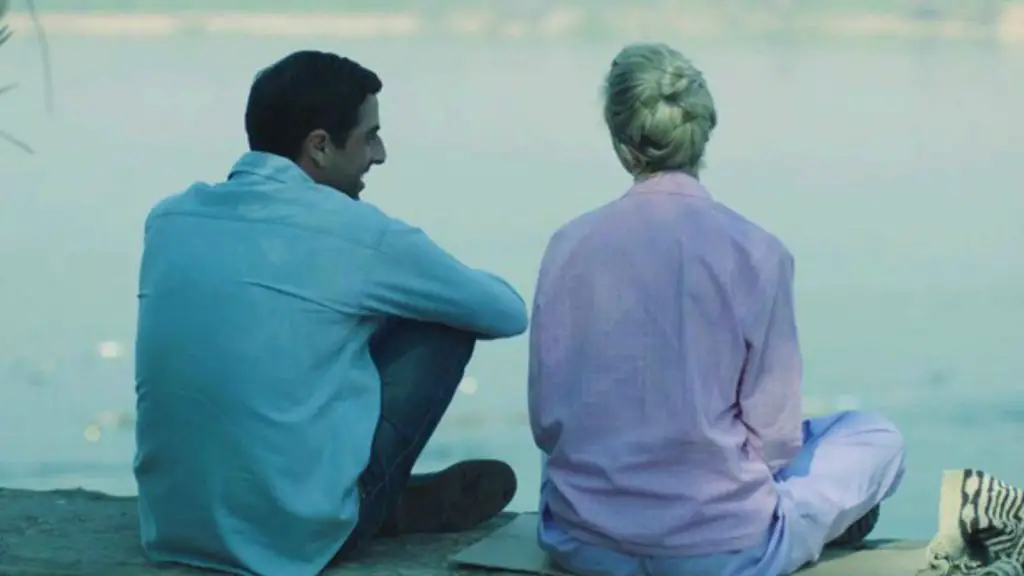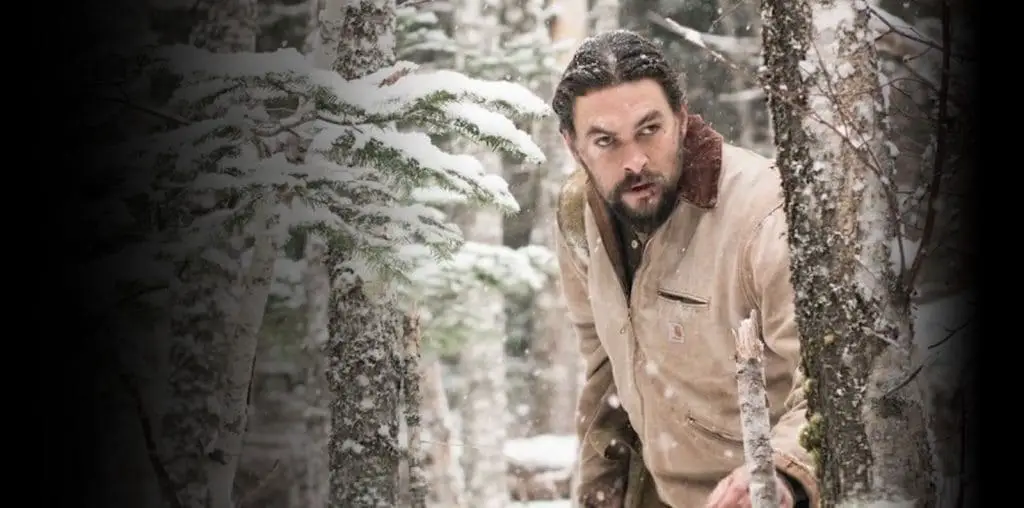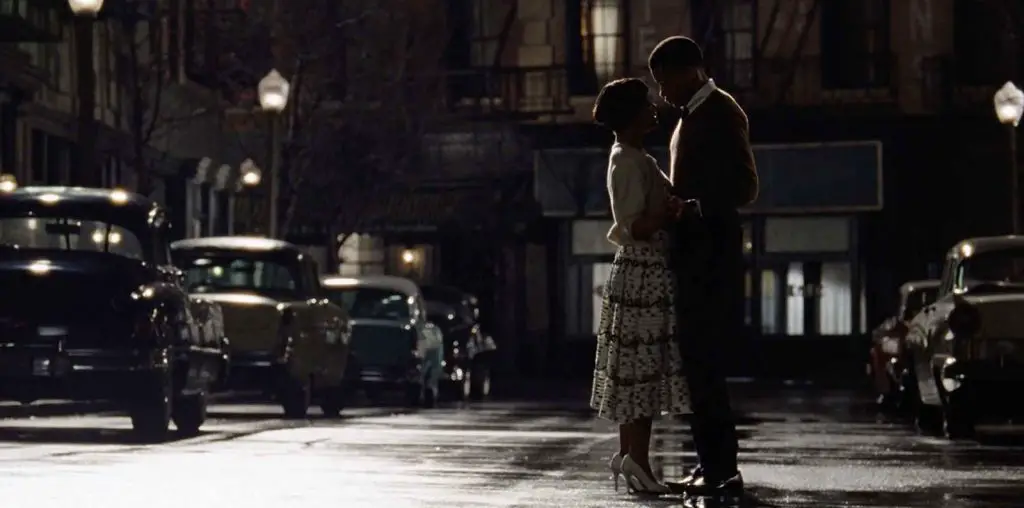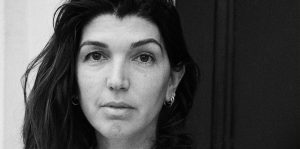
So it just really worked out. Then my son, who was only four months old, I thought, “Oh my God, I can’t just put him on the stone floor.” So we used a blanket, but I wasn’t sure if it worked, but actually, it did work to put the blanket with him on it. Then he kept on flipping over, which was very amusing. It was fun. He had never seen the sun before (from living in London), so the gaffer would put this kind of flag over him every time we said cut. Even though we had so much sun cream on him, he’s four months and super white! We were anxious, but it worked out. It added this sense of everything we were as women, like women as children, childbirth, and also the idea of birth and re-birth, your childhood, and how that affects you. Also, what it means to be a woman. The sequence, to me, embodies so many different elements. You see these children walk, and it was our children, so it was very emotional for us.
Would you say that you had a similar awakening type of experience as Hanna did in the film while making it?
Durra: Oh, sure! I just felt very in touch with the space and the place, and I think the archaeologist really helped me understand. She had a really great line. I said to her, “Do you ever feel the supernatural when you’re in the tombs?” She said, “Any archaeologist who tells you they don’t would be lying.” It’s a wonderful thing that a brilliant, super-intellectual woman is saying that.
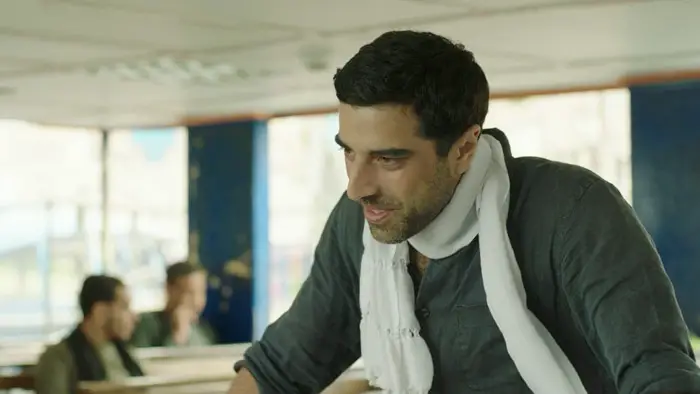
“I want to watch it over and over again. I got so much solace from watching the film.”
Yeah, that’s amazing. That’s just another reason that I want to go to Luxor myself. I wanted to talk to you about how you got to show Luxor at Sundance right before COVID hit. How would you say that COVID is affecting what you’re trying to do now professionally?
Well, I think, with this film, it was a bit heartbreaking that the shutdown happened the day before my theatrical release. I wished we could have got like a week of theatrical because we would have been in quite a few cinemas. Obviously, the booking beforehand was fraught because a cinema chain closed down that would show us. Another one closed until January, so all these places you would assume the film would be shown didn’t, but then some other chains came on but then the lockdown was announced. It was just like, “Oh my God!” That was fraught. Every step was fraught. We decided to go ahead and go on with the release because the film, you can armchair travel with it, but not in an escapist way. You’re really also bringing solace when you show the film. People might find it a healing, wonderful experience full of life and questions. It actually might be quite nice to show people that. That actually turned out to be true because many people are watching it and have had wonderful feedback. Then I’ve got friends e-mailing me or people I’ve known saying, “Oh, I want to watch it over and over again. I got so much solace from watching the film.” It was just amazing. In a way, it worked out for that. Obviously, box office-wise—no, because you want to be in cinemas, and honestly, I think you probably make more money that way. Still, just from an artistic perspective, it’s actually been an okay time for us.
The last thing I’ll ask you, and I know it’s a dorky question, but I love to ask it when I remember to because watching films is my life, essentially. So what was the first film you saw that made you want to be a director?
You know what? I was always taken to see really amazing cinema with my mother, like Chinese cinema, and all the great films from overseas. From a very young age, like actually probably from my daughter’s age. My eldest daughter is almost eight. When you have that exposure, you think it’s almost a given, and that, for me, was just a way to communicate. I find it really interesting because my children write scripts all the time. They take photos and tell stories and have this whole story-life. I think that children naturally have that. Suppose you put them in an environment where they’re exposed to interesting ways of telling a story, a lot of the time they want to do it, you know. The films that I loved growing up. I remember when my mother showed me Annie Hall, she said, “Zeina, come and watch this with me, this is why women wear trousers!” That was my mother’s analysis of the film, and it was quite true because the wardrobe was so revolutionary then. It’s so funny because I watched it, and I think it showed me that film has so much power. That was one of the movies, and then later it was Cleo From 5 to 7. That was a really big influence on me in the way that the seeming trivialities of a woman’s day can actually be so profound. It’s always about a man, and that it was about a woman was so interesting. I was thrilled. I’d watched the movie. It was really enriching.
Now for my lovely discussion with Karim Saleh:
So you first worked with Zeina on The Imperialists Are Still Alive, and 2010 was when it came out, so I wondered what it was like to reunite with her almost ten years later.
Karim Saleh: We kept in touch for most of those years, and I had an idea that she had evolved through reading some script in between Luxor and The Imperialists Are Still Alive, and I knew that her life had changed. Between her student years in New York and being settled and having a family in London. I was expecting the differences related to the stages of life because she’s an artist who works almost intimately. Even if she uses her imagination and gets inspired by things around her, there’s an intimate quality to her writing, always. I almost knew where she was at, roughly. We’ve stayed a little bit, almost like relatives. We’re very close without constantly communicating, but there’s always this closeness between us, which I think makes it very natural for us to work together.
What personally resonated with you and connected you to the character of Sultan in the script?
You know, there’s a tendency in Middle-Eastern based cinema stories, whether they’re created by people from that part of the world or people from other parts of the world, to really focus and place the camera in the most painful, heart-wrenching, heart-breaking events, and images. Or the most terrifying. The fact that Zeina has the subtlety and the decency not to be exploitative and obscene and to allow all the horrors to be completely in the background. We only hear about the Syrian border and the tragedies that Hanna’s character has witnessed by saying that she had been there. There’s nothing explicit. The layering of it and its discretion, and the lack of exploitation, allow me to feel safe reading it immediately. I was curious, and I felt like I was going into a script that would be respectful. Once I was in that groove where I felt safe, I was able to get carried away—not just by his intelligence, but also his journey as someone who is reconnecting with an old love. For me, the love story was really the thing that drew me to the script. There are almost classical elements to it. It was very respectful. It wasn’t very chatty. There was this organic evolution to how they get together. I daydreamed about it being almost golden era Hollywood in my head.
